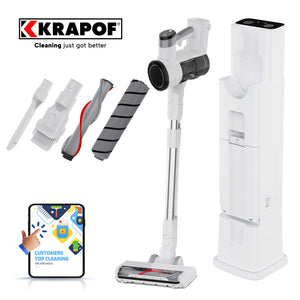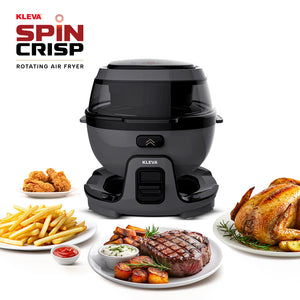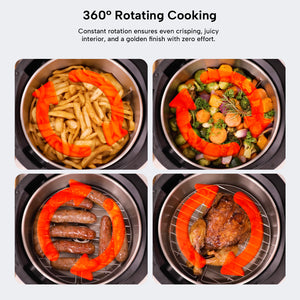
When working with tools, one common issue many of us face is dealing with rusty ones. Whether it's a set of old wrenches inherited from your grandfather or some of your own tools that have seen better days, knowing how to clean rusty tools can give them new life and extend their lifespan.
In this post, we will explore the best way to clean rusty tools, ensuring they stay in great shape for many more years of use.
Understanding how rust forms
Before we delve into how to clean rusty tools, it's crucial to understand what causes rust in the first place. Rust is an iron oxide, a usually red oxide formed by the reaction of iron and oxygen in the presence of water or air moisture. Over time, exposed iron surfaces will inevitably develop rust, especially in damp environments.
Assessing the extent of rust damage
Before you dive into cleaning rusty tools, it's important to assess the extent of the rust and any potential damage it may have caused. Rust can be more than just a surface issue; if left untreated, it can lead to structural damage that may render your tools unsafe or unusable.
Surface rust
Surface rust is the earliest stage of rusting, and it's primarily an aesthetic issue. It appears as a reddish or orange discolouration on the surface of the metal. This stage of rust is relatively easy to remove and doesn't typically affect the integrity of the tool. If you're wondering how to clean old rusty tools that only have surface rust, the vinegar soak or baking soda paste methods mentioned below can be effective.
Scale rust
If rust is allowed to progress, it can turn into scale rust. This is characterised by flaky or powdery layers of rust that start to pit the surface of the metal. At this stage, the rust is starting to compromise the strength and utility of the tool. More aggressive methods may be needed to clean rusty tools at this stage, such as commercial rust removers or even sanding.
Penetrating rust
The most severe level of rust is penetrating rust. This occurs when the rust has eaten all the way through the metal, causing holes and structural damage. If your tools have reached this stage, they may not be safe to use. In some cases, the damage may be too extensive to repair.
Gathering materials needed to clean rusty tools
Whether you're dealing with surface rust or something a bit more severe, cleaning rusty tools requires some specific supplies. Here's a rundown of what you'll need:
- Wire brush — This is an essential tool for scrubbing away rust. A wire brush can get into small crevices and scour away rust more effectively than a regular brush.
- Rust dissolver — Depending on the severity of the rust, you might need a rust dissolver. This could be a homemade solution like vinegar or a commercial rust remover for more serious cases.
- Baking soda — For making a paste to scrub away rust.
- Sandpaper — If the rust is too severe for a wire brush alone, you might need some sandpaper to help remove it. A variety of grits, from coarse to fine, will be helpful.
- Lubricant or oil — After cleaning the rust off, applying some oil or lubricant can help protect the tool from future rusting.
- Protective gear — Safety should always be a priority when working with tools, even when you're just cleaning them. This can include gloves to protect your hands, safety glasses to protect your eyes from any rust particles that may get kicked up, and a mask if you're using a commercial rust remover in a poorly ventilated area.
The best way to clean rusty tools
Knowing how to clean rusty tools is the first step in preserving their functionality and longevity. There are several methods for cleaning rusty tools, and the best one for you will depend on how severe the rust is and what resources you have on hand.
Vinegar soak
One of the simplest and most effective methods for how to clean rusty tools is using a vinegar soak. The acidic nature of vinegar helps to break down and dissolve the rust, making it easier to remove.
To use this method, all you need to do is fill a container large enough for your tools with vinegar, fully submerging the rusty parts. Allow the tools to soak for anywhere from 1 to 24 hours, depending on the severity of the rust.
After soaking, use a scrub brush or an old toothbrush to scrub away the loosened rust particles. Rinse the tools with water and dry them thoroughly to prevent new rust from forming.
Baking soda paste
Another way to clean rusty tools is to use a baking soda paste. Baking soda is a mild abrasive that can effectively scrub away rust without damaging the underlying metal.
To make the paste, mix baking soda with water until you have a thick paste. Apply this paste to your rusty tools and let it sit for a couple of hours. After that, scrub the tools using a brush, rinse off the paste and dry the tools thoroughly.
Commercial rust removers
If the rust is too severe for vinegar or baking soda, a commercial rust remover might be the best method if you’re researching how to clean old rusty tools. These products are specifically designed for rust removal and can be incredibly effective.
Follow the manufacturer's instructions for these products, as they can vary. Most will have you apply the product, wait a certain amount of time, and then scrub away the rust.
Cleaning rusty tools is an important part of tool maintenance, but regular care can help prevent your tools from rusting in the first place. Incorporate simple cleaning practices into your routine, such as wiping down your tools with a dry cloth after each use to remove any moisture or debris. Remember, the best way to clean rusty tools is not only about removing the existing rust, but also about preventing future rust from taking hold.
Unleash your green thumb with Kleva Range's gardening collection
If you’ve found yourself in the unfortunate situation where you need new tools to replace your damaged, rusty ones, then we’ve also got you covered. At Kleva Range, we bring you a variety of high-quality gardening tools and accessories to make your gardening tasks easier and more enjoyable. From carbon steel tools to gutter cleaners, we've got you covered.
Shop our collection now, or get in touch with our team if you have any questions.
 Discounts are applied at checkout
Discounts are applied at checkout





















